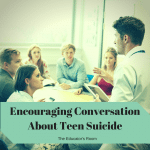Cross-posted at Bluff City Education
 During my first two years of teaching, it seemed as if I had no personal life. The demands of learning the craft required so much of my time and energy that I would often work 12 to 15 hours a day, with little energy or free time left over. I felt stressed and personally unfulfilled. I started to question whether teaching was a viable career for me.
During my first two years of teaching, it seemed as if I had no personal life. The demands of learning the craft required so much of my time and energy that I would often work 12 to 15 hours a day, with little energy or free time left over. I felt stressed and personally unfulfilled. I started to question whether teaching was a viable career for me.
This year—my third—I decided that things would be different. At the beginning of the school year, I made a list detailing what I wanted to accomplish in my personal life. Here’s a sample of what I wrote:
- Exercise for 30 minutes at least five times a week
- Spend one weekend day work-free
- Read one book a month for pleasure
- Spend 15 minutes (minimum) a day reading the news
- Attend church every Sunday
This might not sound like a terribly ambitious list, but any early-career teacher can tell you that completing these tasks within the context of the job’s responsibilities would definitely be challenging. As a result, I knew I’d need to make some changes to how I managed my time if I was to make any of this happen—and over the past four months, I’ve found these five strategies pretty effective:
1. Plan your day the night before. Every night, I sit down and make a list of what I need to accomplish the next day. I then create a realistic schedule that lays it all out hour by hour. If something doesn’t fit, I have to decide whether it’s really that important and if so, what else needs to be taken out of the schedule to accommodate it. This only takes 10 to 15 minutes, but it dramatically increases my daily productivity by forcing me to think through what I can realistically accomplish on a daily basis.
2. Focus on what’s important, and de-prioritize what’s not. Take some time to identify the things that aren’t too important and the things that don’t need to be done right away, both professionally and personally. This allows you to make time for the things that you do want to make a priority.
For example, I sat down over this Christmas break and realized that I was spending an incredible amount of time on something I placed a low priority on—grading—but next to no time on a very high-priority item: parental contact. As a result, I’ve worked out several classroom systems to both decrease what I have to grade and grade what I have more quickly. I’ve been able to then take a large chunk of the time I formerly spent grading to make parent phone calls every Wednesday after school.
If this sounds like something you need to do, check out the important/urgent matrix from Coveyhere.
3. Work when you’re at work, and play when you’re at home. It’s tempting to use free time during the school day to kick back and relax for a few minutes on Netflix or YouTube. But doing so means you’ll have to spend the time later to complete what you’re not doing now. For early-career teachers, this often means losing time from our personal lives. By using work time, you ensure that your work is finished before you go home—so you can truly fulfill your personal goals.
4. Learn how to say no! It can be tempting to take on every new initiative that comes your way, but it can also sap your energy and take away from both your professional and personal happiness. By December in my first year, I found myself running three different extracurricular activities simply because I hadn’t learned how to effectively say no when an opportunity arose.
Today, I only coach one after-school activity (debate), and although I’m often offered chances to take on more, I remember that by saying no I’m able to better focus on what I’m already doing and do it to the best of my abilities.
5. Think outside the box. If I find a personal goal challenging to accomplish, I come up with a creative way to make it happen. For example, I realized early on that I wasn’t going to be able to complete my goals of reading one book a month and reading 15 minutes of news a day—I didn’t have the time or mental energy at the end of the day. Instead, I started downloading news podcasts and audio books to listen to while I clean, exercise, or grade. This has enabled me to actually exceed my personal goals for reading in each of the last two months!
So where am I in pursuit of my goals? I’m able to typically work out at least three times a week, and I’m working towards five. My Saturdays are almost always free, and I’m able to make it to church almost every Sunday. I’ll be the first to admit that I’m not perfect in the pursuit of my personal goals, but I’m making progress compared to where I was.
If you, like me, are looking for ways to take control of your personal life, I hope some of these strategies might be useful for you. Who knows—they just might save your career!
I’d also like to thank Robbye Good and Embark at new Memphis for connecting me with the time management techniques outlined here!






Leave a comment